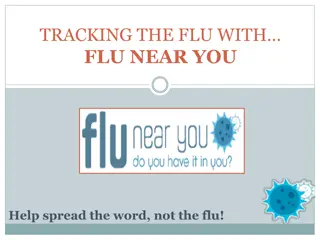Understanding New Jersey's Flu Vaccination Law: What You Need to Know
New Jersey's flu vaccination law, implemented via P.L. 2019, Chapter 330, mandates annual flu vaccinations for healthcare workers in specific facilities. The law aims to protect both staff and patients, prevent a flu and COVID-19 "twindemic," and preserve crucial resources. It is essential for all employees in hospitals, nursing homes, home health agencies, and hospices to receive the flu vaccine annually between October 1 and December 31.
Download Presentation

Please find below an Image/Link to download the presentation.
The content on the website is provided AS IS for your information and personal use only. It may not be sold, licensed, or shared on other websites without obtaining consent from the author. Download presentation by click this link. If you encounter any issues during the download, it is possible that the publisher has removed the file from their server.
E N D
Presentation Transcript
NJ Fights Flu: What You Need to Know About the State s New Flu Vaccination Law
P.L. 2019, Chapter 330 Requires healthcare workers in certain facilities to get seasonal influenza vaccination annually Signed into law by Gov. Murphy in January 2020 2020-2021 influenza season is the first since law s enactment
Why Get the Flu Vaccine? To protect us and the people we care for both here and at home To avoid a twindemic COVID-19 and a busy flu season at the same time To prevent staff from being overburdened To preserve PPE supplies, bed capacity, other resources
Why Mandate the Flu Vaccine? Getting a flu shot is the right thing to do!
Flu Shot Facts Flu shot uses inactivated virus it won t give you the flu o Mild side effects: sore arm, swelling, mild muscle aches, low-grade fever Nasal spray vaccine uses attenuated (weakened) virus o Mild side effects: runny nose, headache, muscle aches It takes about 2 weeks after vaccination to get full protection
N.J. Vaccination Rates 2019-2020 Flu Season: < 50% 2020-2021 DOH Goal: 70%
CDC Recommendations Amid COVID-19 Essential to immunize against preventable diseases. Especially important for vulnerable populations: children, pregnant women, immunocompromised individuals, older adults. Immunize to reduce the burden of respiratory illness to prioritize care for acutely ill COVID patients Immunize to place patients at lesser risks of COVID complications.
What Does the Law Require? Each facility must provide an annual flu vaccine program for all employees between Oct. 1 and Dec. 31. Each employee must receive an influenza vaccination annually, no later than Dec. 31.
Who Does the Law Apply To? ALL employees of: o General or specialty hospitals o Nursing homes o Home health agencies o Hospice and potentially other settings per NJDOH guidance
Getting Vaccinated You may be vaccinated here in our program Or Get the vaccine at another location oMust provide written attestation that you received the vaccine. oAttestation must include lot number of the vaccine.
Exemptions Medical exemptions only o NJDOH provides an exemption form attesting to medical contraindication o Employee must provide that form to the facility
Facilitys Responsibilities Must keep records of all attestations Must review all exemptions for compliance with Advisory Committee on Immunization Practices Must submit all exemption forms to NJDOH Must report facility s employee vaccination rate to NJDOH
If Youre Not Vaccinated Must wear a mask when in direct contact with patients and in common areas May be relocated or reassigned to other areas The facility shall not discharge or reduce the pay of an employee who receives a medical exemption. Facilities may adopt additional policies and procedures with regard to the annual influenza vaccine.
Flus Annual Toll According to national CDC data, last flu season resulted in an estimated: o 39M to 56M illnesses o 18M to 26M medical visits o 410,000 to 740,000 hospitalizations o 24,000 to 62,000 deaths
Flus Annual Toll N.J. hospitals admitted approximately 25,000 flu patients last season.
Flu Symptoms Fever and/or chills Cough Sore throat Runny or stuffy nose Muscle or body aches Headaches Fatigue
Flu Transmission Droplets spreading through air (sneezing, coughing, talking) o People with flu can spread it up to 6 feet away. Contact (surfaces and objects) o Touching a surface with the flu virus on it, then touching your mouth, nose or eyes.
The Flus Spread Virus may be spread 1 day before symptoms and 5 to 7 days after onset of illness. Most contagious in first 3-4 days of illness onset. Children and people with weakened immune symptoms may pass virus beyond 7 days.
How Else Do We Protect Patients/ Residents? CDC Clinical Recommendations Assess vaccination during each patient encounter o Flu vaccine is recommended for persons 6 months of age and older Identify priority populations o Essential workers, those at increased risk of COVID-19, people with underlying conditions, pregnant women, the elderly
How Else Do We Protect Ourselves? Wear facemasks Wash hands frequently with soap and water or alcohol-based hand sanitizer. Adhere to social distancing Cover coughs and sneezes Avoid touching eyes, nose and mouth Clean and disinfect surfaces and objects
Vaccination Opportunities [Use this slide(s) to add detail of your vaccination plans.]
Questions? [Use this slide to provide contact information for follow-up questions.]
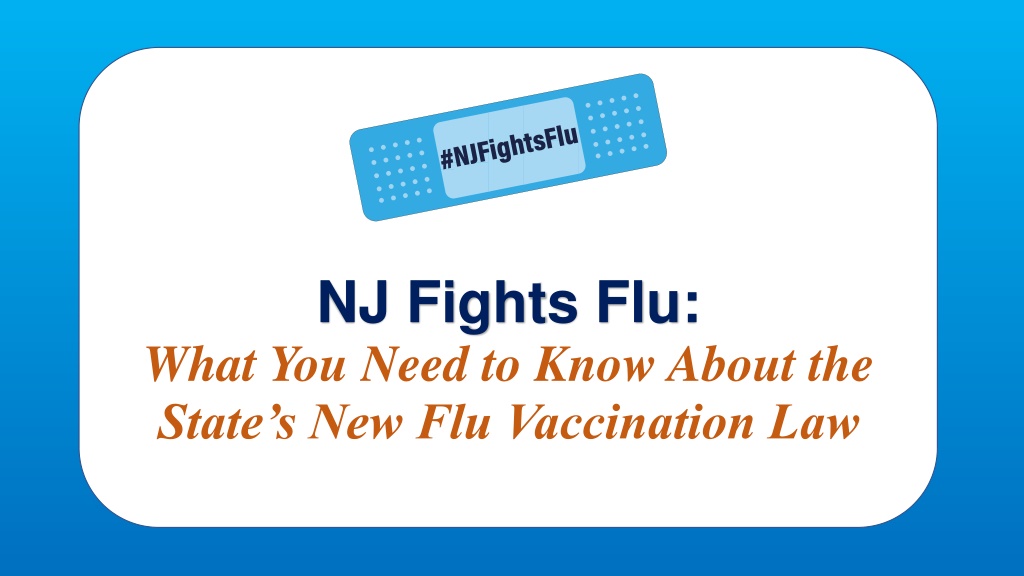




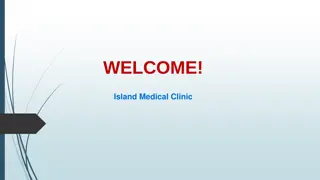


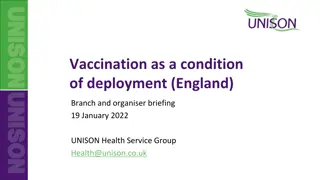
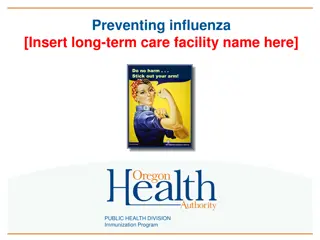

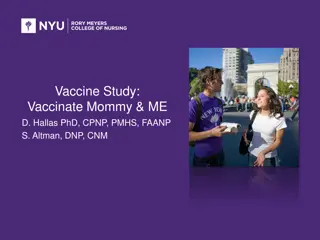
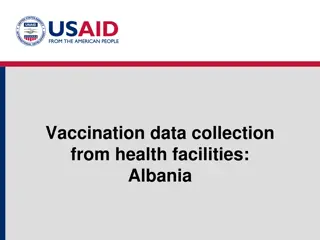
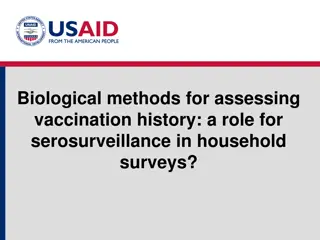
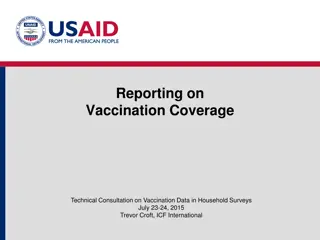
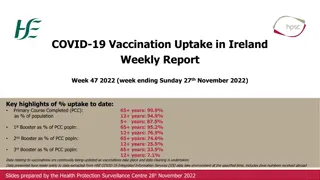
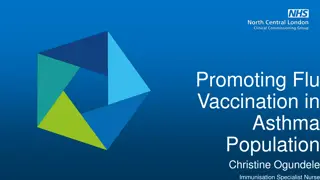
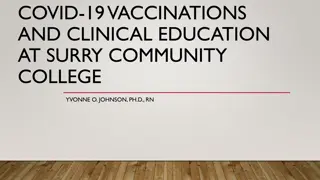
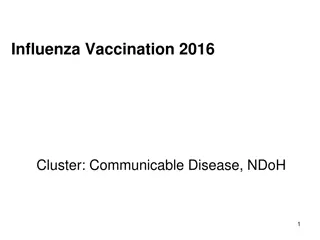
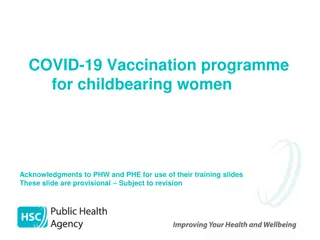
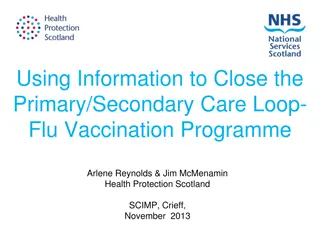
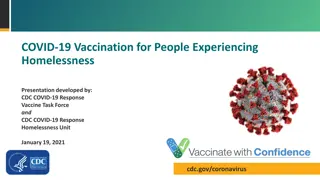
![Preventing Influenza at [Name of Critical Access Hospital]](/thumb/233818/preventing-influenza-at-name-of-critical-access-hospital.jpg)
